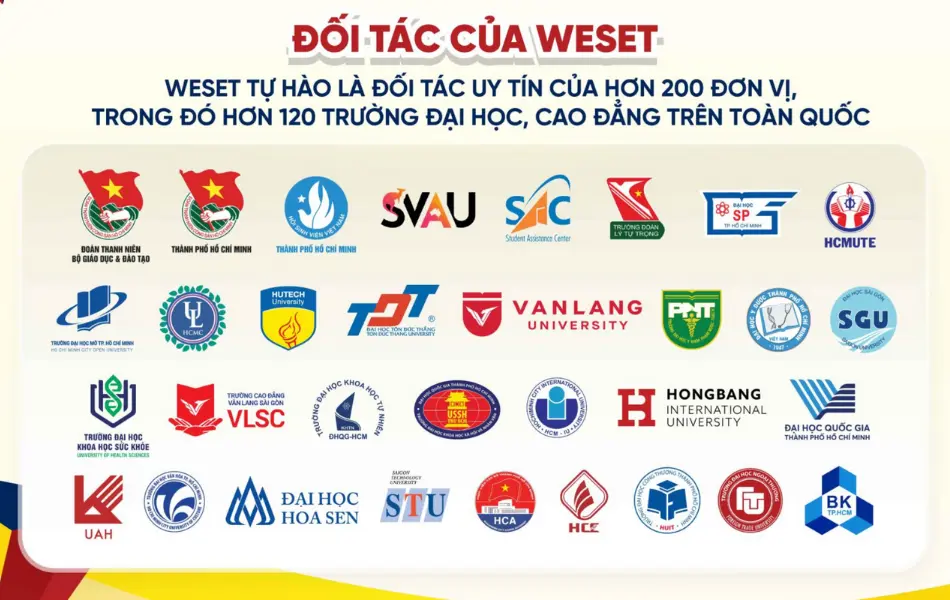Parts of speech là gì? Phân loại các từ trong tiếng Anh
- Admin
- Blog, Blog học tiếng Anh
MỤC LỤC
Hiểu đơn giản, parts of speech (hay còn gọi là các loại từ) là cách mà chúng ta phân loại các từ trong tiếng Anh dựa trên vai trò, chức năng của chúng trong câu. Mỗi loại từ đảm nhận một nhiệm vụ riêng, phối hợp với nhau tạo thành một “team” ăn ý, giúp câu văn trở nên có nghĩa. Cùng WESET “giải mã” từng thành viên trong “team” này nhé!

Phân loại các từ trong tiếng Anh
Parts of speech là gì?
Parts of speech là thuật ngữ ngữ pháp dùng để chỉ các loại từ trong tiếng Anh. Mỗi loại từ có chức năng riêng biệt, quyết định cách nó được sử dụng trong câu. Việc nắm vững các loại từ này không chỉ giúp bạn xây dựng câu đúng ngữ pháp mà còn cải thiện khả năng đọc hiểu và giao tiếp.
Trong tiếng Anh, có 8 loại từ chính. Một số loại từ có thể thay đổi chức năng tùy theo ngữ cảnh, điều này đôi khi gây bối rối cho người học. Tuy nhiên, khi bạn nắm chắc bản chất, việc này sẽ trở nên dễ dàng hơn rất nhiều. Vậy, đâu là những loại từ này? Chúng ta hãy cùng tìm hiểu sâu hơn về từng loại.
Vị trí và chức năng của các loại từ
Danh từ (Noun)
Danh từ là một trong những thành phần cơ bản và quan trọng nhất của parts of speech. Danh từ dùng để gọi tên người, sự vật, sự việc, địa điểm, khái niệm, cảm xúc. Nói chung, bất cứ thứ gì có thể đặt tên, đều là danh từ.
Chức năng chính của danh từ là làm chủ ngữ, tân ngữ trực tiếp hoặc gián tiếp, bổ ngữ cho chủ ngữ trong câu. Danh từ được chia thành nhiều loại nhỏ hơn để dễ phân biệt:
Proper Nouns: Tên riêng
Chỉ tên cụ thể của người, địa điểm, tổ chức. Luôn được viết hoa chữ cái đầu tiên. Bảng ví dụ:
| Tên người | Thành phố | Quốc gia |
|---|---|---|
| Anh Tuấn | Hà Nội | Việt Nam |
| Lan Phương | Seoul | Hàn Quốc |
| Minh Khoa | Bangkok | Thái Lan |
| Hồng Nhung | Singapore | Singapore |
| Hoàng Nam | Kuala Lumpur | Malaysia |
| Mai Anh | Jakarta | Indonesia |
| Thanh Bình | Manila | Philippines |
| Ngọc Trâm | New Delhi | Ấn Độ |
| Quang Huy | Dubai | UAE |
| Thu Thảo | Doha | Qatar |
Common Nouns: Danh từ chung
Chỉ tên chung chung của sự vật, không cụ thể. Ví dụ: city, car, book. Ngoài ra danh từ chung có 2 loại cơ bản là đếm được và không đếm được. Một số countable nouns và uncountable nouns:
| Danh từ đếm được | Danh từ không đếm được |
|---|---|
| apple | advice |
| bird | coffee |
| book | experience |
| car | fruit |
| class | furniture |
| dog | information |
| doll | knowledge |
| orange | money |
| shirt | music |
| table | water |
| chair | rice |
| house | salt |
| pen | sand |
| student | traffic |
| tree | weather |
Collective Nouns: Danh từ tập hợp
Chỉ một nhóm người, vật. Ví dụ: team, family, flock. Một số danh từ tập hợp các bạn có thể tham khảo:
| Danh từ tập hợp | Định nghĩa | Ví dụ |
|---|---|---|
| audience | Khán giả | The audience clapped loudly after the show. |
| committee | Ủy ban | The committee decided on the new school rules. |
| crowd | Đám đông | A large crowd gathered in the city square. |
| family | Gia đình | Her family supports her in every decision. |
| jury | Ban hội thẩm | The jury reached a unanimous verdict. |
| team | Đội nhóm | The team won the championship after months of practice. |
| panel | Ban cố vấn | The panel of experts discussed the topic in detail. |
| staff | Nhân viên | The hospital staff worked tirelessly to help patients. |
| troop | Đội quân, đoàn | A troop of scouts camped near the river. |
| choir | Dàn hợp xướng | The choir sang beautifully at the ceremony. |
Abstract Nouns: Danh từ trừu tượng
Chỉ những thứ không thể chạm, nhìn, ngửi thấy,… mà chỉ có thể cảm nhận. Ví dụ: love, happiness, freedom.
Tham khảo thêm:
| Danh từ trừu tượng | Định nghĩa | Ví dụ |
|---|---|---|
| honesty | Sự trung thực | Honesty is the foundation of strong relationships. |
| kindness | Lòng tốt | Acts of kindness can brighten someone’s day. |
| loyalty | Lòng trung thành | Loyalty to friends is highly valued. |
| peace | Hòa bình | The world longs for lasting peace among nations. |
| strength | Sức mạnh | Inner strength helps us overcome difficulties. |
| faith | Niềm tin | Faith can guide people through hard times. |
| creativity | Sự sáng tạo | Creativity drives innovation and progress. |
| gratitude | Lòng biết ơn | Gratitude makes us appreciate what we have. |
| bravery | Lòng dũng cảm | Bravery is admired in those who face danger. |
| respect | Sự tôn trọng | Mutual respect is vital in any community. |
Compound Nouns: Danh từ ghép
Được tạo thành từ hai hoặc nhiều từ. Ví dụ: mother-in-law, school bus, living room.
Tham khảo thêm:
| Danh từ ghép | Định nghĩa | Ví dụ |
|---|---|---|
| notebook | vở ghi chép | She wrote her ideas in a small notebook. |
| airport | sân bay | The plane landed safely at the airport. |
| teacup | tách trà | He poured hot tea into the teacup. |
| snowman | người tuyết | The children built a snowman in the yard. |
| keyboard | bàn phím | The computer keyboard stopped working. |
| basketball | bóng rổ | They often play basketball after school. |
| blackboard | bảng đen | The teacher wrote the lesson on the blackboard. |
| sunflower | hoa hướng dương | A tall sunflower grew in the garden. |
| bedroom | phòng ngủ | The bedroom was clean and well-decorated. |
| rainbow | cầu vồng | A beautiful rainbow appeared after the rain. |
Đại từ (Pronoun)
Đại từ là “người đóng thế” cho danh từ để tránh việc lặp từ trong câu văn. Chúng giúp câu văn trở nên mượt mà và tự nhiên hơn.
- Ví dụ: Thay vì nói “Mary is a good student. Mary studies hard.”, bạn có thể nói “Mary is a good student. She studies hard.”.
Đại từ nhân xưng (Personal Pronouns)
| Đại từ nhân xưng | Định nghĩa | Ví dụ |
|---|---|---|
| I | Tôi | I am going to the store. |
| you | Bạn | Are you coming to the party? |
| he | Anh ấy | He is studying for his exam. |
| she | Cô ấy | She is reading a book. |
| it | Nó | The cat is sleeping. It looks tired. |
| we | Chúng tôi | We are going on a trip. |
| they | Họ | They went to the beach. |
| me | Tôi | Can you pass me the salt? |
| him | Anh ấy | I saw him at the park. |
| her | Cô ấy | I gave her a gift for her birthday. |
Đại từ chỉ định (Demonstrative Pronouns)
| Đại từ chỉ định | Định nghĩa | Ví dụ |
|---|---|---|
| this | Đây | This is my favorite book. |
| that | Đó | That car belongs to my neighbor. |
| these | Những cái này | These apples are fresh. |
| those | Những cái đó | Those shoes look comfortable. |
| such | Như vậy | She made such a beautiful cake. |
| The former | Cái trước | I prefer the former option. |
| The latter | Cái sau | She chose the latter alternative. |
| one | Một | One is never too old to learn. |
| ones | Những cái | Can you pass me the blue ones? |
| another | Một cái khác | I need another pen. |
Đại từ nghi vấn (Interrogative Pronouns)
| Đại từ nghi vấn | Định nghĩa | Ví dụ |
|---|---|---|
| who | Ai | Who is that person over there? |
| whom | Ai | Whom did you invite to the party? |
| what | Cái gì | What is your favorite color? |
| which | Nào | Which book do you recommend? |
| whose | Của ai | Whose pen is this? |
| where | Ở đâu | Where is the nearest grocery store? |
| when | Khi nào | When is your birthday? |
| why | Tại sao | Why did you choose that option? |
| how | Như thế nào | How did you solve the problem? |
Đại từ quan hệ (Relative Pronouns)
| Đại từ quan hệ | Định nghĩa | Ví dụ |
|---|---|---|
| who | Người | The person who called me is my friend. |
| whom | Người | The girl whom I met yesterday is a talented musician. |
| which | Cái | The book which is on the table is mine. |
| that | Cái | The car that I bought last year is very reliable. |
| whose | Của ai | The student whose notebook was lost is looking for it. |
| where | Nơi | I visited the place where I grew up. |
| when | Khi | This is the day when we first met. |
| why | Tại sao | The reason why she left the party early is unclear. |
| what | Cái gì | Tell me what you want for your birthday. |
Tính từ (Adjective)
Tính từ là “nghệ sĩ trang điểm”, có vai trò tô điểm, mô tả đặc điểm, tính chất của danh từ hoặc đại từ. Chúng thường đứng trước danh từ mà chúng bổ nghĩa. Ví dụ: a beautiful house, a smart boy.
Động từ (Verb)
Động từ là “linh hồn” của câu, diễn tả hành động, trạng thái hoặc sự tồn tại của chủ ngữ. Mỗi câu trong tiếng Anh đều phải có ít nhất một động từ. Ví dụ: He runs fast. She is happy.
Động từ chỉ hành động (Action Verbs)
| Động từ chỉ hành động | Định nghĩa | Ví dụ |
|---|---|---|
| listen | nghe | She likes to listen to music while studying. |
| cook | nấu ăn | My mother often cooks delicious meals for the family. |
| draw | vẽ | The little boy drew a picture of his house. |
| climb | leo, trèo | They climbed the mountain together last summer. |
| smile | mỉm cười | She smiled happily when she saw her friend. |
| open | mở | He opened the window to let in fresh air. |
| close | đóng | Please close the door when you leave the room. |
| build | xây dựng | They are building a new bridge across the river. |
| laugh | cười | The children laughed loudly at the funny story. |
| travel | du lịch | He loves to travel and explore new countries. |
Động từ nối (Linking Verbs)
| Động từ nối | Định nghĩa | Ví dụ |
|---|---|---|
| stay | ở lại, giữ nguyên | He stayed calm during the emergency situation. |
| prove | chứng tỏ, hóa ra | The plan proved successful after months of preparation. |
| grow | trở nên, phát triển thành | The child grew stronger after regular exercise. |
| turn | trở thành, chuyển thành | The leaves turned yellow in autumn. |
| get | trở nên | It’s getting dark outside, let’s head home. |
| come | hóa ra, trở thành | Her dream came true when she won the competition. |
| go | trở nên (thường kèm tính từ tiêu cực) | The milk went sour after being left out overnight. |
| fall | rơi vào trạng thái | He fell silent when the teacher entered the room. |
| run | hóa ra, trở nên | The event ran smoothly despite the heavy rain. |
| end up | kết thúc bằng việc trở thành | She ended up becoming a successful writer. |
Động từ có tân ngữ (Transitive Verbs)
| Động từ có tân ngữ | Định nghĩa | Ví dụ |
|---|---|---|
| bring | mang, đem | Please bring your homework to class tomorrow. |
| carry | mang, vác | She carried a heavy bag of groceries home. |
| hold | cầm, giữ | He held the baby gently in his arms. |
| choose | chọn | She chose a red dress for the party. |
| catch | bắt, nắm | The boy caught the ball during the game. |
| write | viết | He wrote a letter to his grandmother. |
| lend | cho mượn | She lent her friend some money for lunch. |
| borrow | mượn | He borrowed a book from the library. |
| wear | mặc, đội | She wore a hat to protect herself from the sun. |
| use | sử dụng | He used his phone to call a taxi. |
Động từ không có tân ngữ (Intransitive Verbs)
| Động từ không có tân ngữ | Định nghĩa | Ví dụ |
|---|---|---|
| sleep | ngủ | She sleeps peacefully through the night. |
| die | mất | The old man died peacefully in his sleep. |
| laugh | cười | The children laughed at the funny clown. |
| cry | khóc | She couldn’t help but cry when she heard the sad news. |
| sing | hát | The singer sang a beautiful song at the concert. |
| run | chạy | He ran as fast as he could to catch the bus. |
| dance | nhảy múa | They danced gracefully on the stage, showcasing their talent. |
| walk | đi bộ | She walks to work every day instead of taking the bus. |
| blink | chớp mắt | He blinked his eyes several times to clear his vision. |
| smile | cười mỉm | The little girl smiled brightly when she saw her favorite toy. |
Động từ khiến làm (Causative Verbs)
| Động từ khiến làm | Định nghĩa | Ví dụ |
|---|---|---|
| allow | cho phép | The manager allowed the employees to take a day off for personal reasons. |
| enable | cho phép | The new software enables users to edit photos easily. |
| entice | lôi kéo | The delicious smell of the bakery enticed customers to enter. |
| force | ép buộc | The dictator forced the citizens to obey his orders. |
| have | để | They had their car repaired at the mechanic’s shop. |
| help | giúp | The teacher helped the students understand the difficult concept. |
| let | cho phép | She lets her children watch TV for an hour every day. |
| make | làm cho | My parents made me clean my room before going out. |
| persuade | thuyết phục | He persuaded his friend to join him on the adventure trip. |
| require | yêu cầu | The job requires you to have excellent communication skills. |
Động từ tạo ra tân ngữ (Factitive Verbs)
| Động từ tạo ra tân ngữ | Định nghĩa | Ví dụ |
|---|---|---|
| appoint | bổ nhiệm | The company appointed her as the new manager. |
| crown | đính vương miện | The queen crowned her as the new queen. |
| designate | chỉ định | The teacher designated him as the class representative. |
| elect | bầu chọn | They elected him as the new president. |
| hire | tuyển dụng | The company hired him as a software engineer. |
| make | tạo ra | She made a cake for the birthday party. |
| name | đặt tên | They named their baby girl Lily. |
| nominate | đề cử | The committee nominated him for the prestigious award. |
| select | chọn lựa | They selected her to be part of the team. |
Trợ động từ (Auxiliary/Helping Verbs)
| Động từ trợ | Định nghĩa | Ví dụ |
|---|---|---|
| be | là | She is studying for her exams. |
| have | có | They have finished their homework. |
| will | sẽ | I will go to the party tomorrow. |
| can | Có thể | He can speak three languages fluently. |
| should | nên | You should eat more fruits and vegetables. |
| could | Có thể | She could play the piano when she was young. |
| do | làm | Did you finish your homework? |
| would | sẽ | He would help you if you ask. |
| may | Có thể | You may leave the meeting early if you have a valid reason. |
| must | Bắt buộc | We must finish the project by the end of the week. |
Trạng từ (Adverb)
Trạng từ là “phụ tá” đắc lực, thường dùng để bổ nghĩa cho động từ, tính từ hoặc một trạng từ khác. Trạng từ cho biết hành động diễn ra như thế nào, ở đâu, khi nào hoặc mức độ ra sao.
- Ví dụ: She sings beautifully. He ran quickly.
Trạng từ tần suất (Frequency Adverbs)
| Trạng từ tần suất | Định nghĩa | Ví dụ |
|---|---|---|
| always | Luôn luôn | She always arrives on time for work. |
| frequently | Thường xuyên | The bus arrives frequently during rush hour. |
| never | Không bao giờ | He never eats spicy food. |
| occasionally | Thỉnh thoảng | They occasionally travel to different countries. |
| often | Thường xuyên | We often have dinner together as a family. |
| regularly | Đều đặn | He always helps his friends when they need him. |
| rarely | Hiếm khi | They rarely go to the movies. |
| seldom | Hiếm khi | She seldom complains about anything. |
| sometimes | Đôi khi | I sometimes go jogging in the morning. |
Trạng từ chỉ cách thức (Manner Adverbs)
| Trạng từ chỉ cách thức | Định nghĩa | Ví dụ |
|---|---|---|
| calmly | Bình tĩnh | She spoke calmly during the stressful situation. |
| carefully | Cẩn thận | He handled the delicate items carefully. |
| eagerly | Hăm hở | The children eagerly opened their presents on Christmas morning. |
| enthusiastically | Hăng hái | The team members enthusiastically cheered for their victory. |
| loudly | To lớn | The music was playing loudly at the party. |
| quickly | Nhanh chóng | She completed the task quickly and efficiently. |
| quietly | Im lặng | The baby slept quietly in her crib. |
| skillfully | Tài ba | The artist painted skillfully with intricate details. |
| slowly | Chậm chạp | The traffic moved slowly due to the heavy rain. |
| smoothly | Mượt mà | The car ride went smoothly without any bumps. |
Trạng từ chỉ thời gian (Time Adverbs)
| Trạng từ thời gian | Định nghĩa | Ví dụ |
|---|---|---|
| already | Đã | She has already finished her homework. |
| currently | Hiện tại | The company is currently undergoing restructuring. |
| eventually | Cuối cùng | They will eventually find a solution to the problem. |
| now | Bây giờ | He is busy with work now. |
| recently | Gần đây | I visited my grandparents recently. |
| soon | Sớm | The movie will start soon. |
| suddenly | Đột ngột | The phone rang suddenly, startling everyone in the room. |
| today | Hôm nay | I will meet her for lunch today. |
| tomorrow | Ngày mai | They have an important meeting tomorrow. |
| yesterday | Hôm qua | We went to the beach yesterday. |
Trạng từ chỉ địa điểm, nơi chốn (Place Adverbs)
| Trạng từ nơi chốn | Định nghĩa | Ví dụ |
|---|---|---|
| abroad | Nước ngoài | They are planning to study abroad next year. |
| downstairs | Lầu dưới | He rushed downstairs to answer the doorbell. |
| everywhere | Khắp nơi | The children’s toys were scattered everywhere in the room. |
| here | Ở đây | The keys are here on the table. |
| inside | Bên trong | The cat is hiding inside the box. |
| nearby | Gần đây | There is a café nearby where we can grab a coffee. |
| nowhere | Không đâu | He could find his wallet nowhere in the house. |
| outside | Bên ngoài | They enjoyed playing outside in the park. |
| there | Ở đó | The bookstore is located there across the street. |
| upstairs | Lầu trên | She went upstairs to her bedroom to get her book. |
Trạng từ liên kết (Conjunctive Adverbs)
| Trạng từ liên kết | Định nghĩa | Ví dụ |
|---|---|---|
| however | Tuy nhiên | She studied hard; however, she didn’t perform well in the exam. |
| therefore | Do đó | The weather was bad; therefore, the outdoor event was canceled. |
| furthermore | Hơn nữa | She is talented and hardworking; furthermore, she is a great team player. |
| meanwhile | Trong khi đó | He was busy with his work; meanwhile, his colleagues were enjoying a coffee break. |
| nevertheless | Tuy nhiên | The project faced challenges; nevertheless, they managed to complete it on time. |
| moreover | Hơn nữa | The project is not only on schedule but moreover, it is also under budget. |
| consequently | Do đó | He didn’t study for the exam; consequently, he failed. |
| nonetheless | Tuy nhiên | The weather was bad; nonetheless, they decided to go hiking. |
| thus | Do đó | He saved enough money; thus, he was able to buy a new car. |
| on the other hand | Mặt khác | She enjoys swimming, but on the other hand, she dislikes running. |
Từ hạn định (Determiner)
Từ hạn định là một loại parts of speech thường đứng trước danh từ, có chức năng xác định hoặc giới hạn ý nghĩa của danh từ đó. Ví dụ: a, an, the, this, that, my, your, some, any.
Giới từ (Preposition)
Giới từ là những từ ngắn, dùng để chỉ mối quan hệ giữa các từ khác trong câu, thường là về vị trí, thời gian, hoặc phương hướng.
- Ví dụ: in, on, at, under, with, for.
Giới từ chỉ địa điểm, nơi chốn (Place Prepositions)
| Giới từ nơi chốn | Định nghĩa | Ví dụ |
|---|---|---|
| at | Tại | She is waiting for you at the bus stop. |
| in | Trong | The keys are in the drawer. |
| on | Trên | The book is on the table. |
| under | Dưới | The cat is sleeping under the bed. |
| above | Phía trên | The painting is hanging above the fireplace. |
| below | Phía dưới | The shoes are kept below the coat rack. |
| beside | Bên cạnh | He sat beside his best friend during the concert. |
| between | Ở giữa | The car is parked between two trees. |
| behind | Đằng sau | The playground is behind the school building. |
| next to | Kế bên | The supermarket is next to the post office. |
Giới từ chỉ thời gian (Time Prepositions)
| Giới từ thời gian | Định nghĩa | Ví dụ |
|---|---|---|
| during | Trong suốt | I like to read books during my free time. |
| until | Cho đến khi | They waited at the bus stop until the bus arrived. |
| after | Sau khi | We went for a walk after dinner. |
| before | Trước khi | Please submit your assignment before the deadline. |
| at | Vào | The meeting is scheduled at 2 p.m. |
| on | Vào ngày, vào thời điểm cụ thể | The party is on Saturday. |
| in | Trong khoảng thời gian, trong tháng/năm | She will start her new job in September. |
| since | Từ khi | I have known him since we were in high school. |
| by | Trước một thời điểm cụ thể | Please complete the report by Friday. |
| from…to/until | Từ…đến | The store is open from Monday to Saturday. |
Các giới từ khác (Other Prepositions)
| Giới từ khác | Định nghĩa | Ví dụ |
|---|---|---|
| besides | Ngoài ra | Besides English, she also speaks French and German. |
| despite | Mặc dù | Despite the rain, we went for a walk. |
| without | Không có | He managed to finish the project without any help. |
| within | Trong khoảng thời gian, trong phạm vi | Please complete the task within the next hour. |
| among | Giữa, trong số | The prize was divided among the three winners. |
| around | Xung quanh | We walked around the park and enjoyed the scenery. |
| beneath | Dưới | The cat hid beneath the table. |
| except | Ngoại trừ | Everyone attended the meeting except for John. |
| towards | Về phía | She walked towards the bus stop. |
| with | Với | He went to the party with his friends. |
Liên từ (Conjunction)
Liên từ có nhiệm vụ “kết nối” các từ, cụm từ, hoặc mệnh đề lại với nhau, tạo thành câu phức tạp hơn.
- Ví dụ: and, but, or, so, because.
Liên từ kết hợp (Coordinating Conjunctions)
| Liên từ kết hợp | Định nghĩa | Ví dụ |
|---|---|---|
| and | Và | I like to read books and watch movies. |
| but | Nhưng | She studied hard, but she didn’t pass the exam. |
| or | Hoặc | Would you like tea or coffee? |
| nor | Cũng không | He neither confirmed nor denied the allegations. |
| for | Vì | He didn’t eat much, for he wasn’t hungry. |
| yet | Nhưng mà | She is tired, yet she keeps working. |
| so | Vì vậy | It was raining, so we stayed indoors. |
| because | Bởi vì | He couldn’t attend the meeting because he was sick. |
| either…or | Hoặc…hoặc | You can either come with us or stay here. |
| neither…nor | Không…cũng không | Neither John nor Mary attended the party. |
Liên từ phụ thuộc (Subordinating Conjunctions)
| Liên từ phụ thuộc | Định nghĩa | Ví dụ |
|---|---|---|
| because | Bởi vì | I stayed home because it was raining. |
| although | Mặc dù | Although it was cold, she went out in a T-shirt. |
| if | Nếu | If you study hard, you will pass the exam. |
| when | Khi | I will call you when I arrive at the airport. |
| while | Trong khi | She listened to music while doing her homework. |
| until | Cho đến khi | They played games until it got dark. |
| after | Sau khi | We went out for dinner after the movie ended. |
| before | Trước khi | Please finish your homework before going to bed. |
| since | Kể từ khi | I have known him since we were in college. |
| whether | Liệu | I don’t know whether he will come or not. |
Liên từ tương quan (Correlative conjunction)
| Các liên từ tương quan | Định nghĩa | Ví dụ |
|---|---|---|
| either…or | hoặc…hoặc | You can either come with us or stay at home. |
| neither…nor | không…cũng không | Neither John nor Mary attended the party. |
| both…and | cả…và | She is both intelligent and hardworking. |
| not only…but also | không chỉ…mà còn | He is not only a talented musician but also a skilled painter. |
| whether…or | dù…hay | I don’t know whether he will come or not. |
| as…as | càng…càng | He is as tall as his brother. |
| just as…so | cũng như…vậy | Just as she loves to sing, so does her sister. |
| such…that | quá…đến mức | It was such a hot day that we decided to go swimming. |
| no sooner…than | không chừng…thì | No sooner had she arrived home than it started to rain. |
Thán từ (Interjection)
Thán từ là những từ bộc lộ cảm xúc đột ngột, thường đứng độc lập và không ảnh hưởng đến cấu trúc ngữ pháp của câu.
Ví dụ: Wow!, Oh no!, Oops!.
Tham khảo thêm:
| Thán từ | Định nghĩa | Ví dụ |
|---|---|---|
| Oh! | Biểu thị sự ngạc nhiên, vui mừng hoặc buồn bã | Oh! I didn’t know you were here. |
| Wow! | Thể hiện sự ngạc nhiên hoặc ấn tượng mạnh | Wow! That’s an amazing performance. |
| Ouch! | Diễn tả sự đau đớn | Ouch! That really hurts. |
| Oops! | Thể hiện sự lỡ tay, sai sót nhỏ | Oops! I dropped my phone. |
| Hey! | Dùng để gọi ai đó hoặc thu hút sự chú ý | Hey! Wait for me. |
| Alas! | Bày tỏ sự tiếc nuối hoặc buồn rầu | Alas! He failed the exam. |
| Hurray! | Thể hiện niềm vui, sự chiến thắng | Hurray! We won the game. |
| Eh? | Thể hiện sự nghi ngờ, chưa nghe rõ hoặc yêu cầu lặp lại | Eh? What did you say? |
| Yikes! | Bày tỏ sự sợ hãi hoặc bất ngờ khó chịu | Yikes! That’s a huge spider. |
Hướng dẫn phân biệt các loại từ trong tiếng Anh
Việc phân biệt các loại từ là một kỹ năng quan trọng để bạn có thể sử dụng tiếng Anh một cách chính xác. Dưới đây là một vài mẹo nhỏ giúp bạn nhận diện chúng:
- Dựa vào vị trí: Ví dụ, tính từ thường đứng trước danh từ và sau động từ “to be”. Trạng từ thường đứng sau động từ.
- Dựa vào hậu tố: Nhiều từ có hậu tố đặc trưng giúp bạn đoán được loại từ của chúng. Ví dụ:
- Danh từ: -tion (information), -ment (development), -ness (happiness)
- Tính từ: -ful (beautiful), -ous (dangerous), -able (reliable)
- Trạng từ: -ly (quickly)
- Dựa vào chức năng: Tự hỏi bản thân xem từ đó có chức năng gì trong câu? Nó đang mô tả, hành động, hay kết nối? Việc này sẽ giúp bạn hiểu sâu hơn về vai trò của từng loại trong parts of speech.
Bài tập về Parts of speech
Để kiểm tra kiến thức, hãy thử phân loại parts of speech của các từ được in đậm dưới đây. Không cần nhìn đáp án vội, hãy thử sức mình nhé!
- The fast car drove quickly.
- She is a very kind person.
- They went to the cinema and ate popcorn.
- Ouch! That hurts!
- My little brother loves to play soccer.
Đáp án:
- fast (Tính từ), quickly (Trạng từ)
- She (Đại từ), very (Trạng từ)
- to (Giới từ), and (Liên từ)
- Ouch (Thán từ)
- little (Tính từ), to (Giới từ)
WESET – Trung tâm luyện thi tiếng Anh cam kết đầu ra

WESET English Center
WESET English Center – trung tâm luyện thi tiếng Anh cam kết đầu ra tại TP HCM. Với nhiều năm kinh nghiệm trong lĩnh vực đào tạo tiếng Anh. WESET tự hào là trung tâm luyện thi IELTS, luyện thi TOEIC chuyên sâu uy tín giúp hàng ngàn học viên đạt được ước mơ du học, định cư và phát triển sự nghiệp:
- Đội ngũ giáo viên chuyên môn cao: 100% giáo viên tại WESET đều có chứng chỉ IELTS từ 7.5+ – 8.0+ và phương pháp giảng dạy học từ gốc, vững nền tảng, không dạy mẹo hay đoán đề.
- Lộ trình học cá nhân hóa: Thiết kế riêng biệt cho từng học viên, đảm bảo hiệu quả tối ưu.
- Môi trường học tập hiện đại: Cơ sở vật chất tiện nghi, sĩ số lớp nhỏ, tạo điều kiện tương tác tối đa.
- Cam kết đầu ra bằng văn bản: WESET tự tin với chất lượng đào tạo, cam kết giúp bạn đạt band điểm mục tiêu.
- Hoạt động ngoại khóa đa dạng: Giúp học viên thực hành tiếng Anh trong môi trường thực tế, phát triển toàn diện.
✅ Hơn 200 đơn vị đối tác đồng hành, trong đó hơn 120 trường Đại học & Cao đẳng đã ký kết tại TP.HCM và cả nước
✅ Cam kết IELTS/TOEIC/PTE đầu ra bằng văn bản. Hỗ trợ lệ phí thi lên đến 100%
✅ Đội ngũ giáo viên có điểm IELTS trung bình từ 8.0+, có chứng chỉ sư phạm/ TESOL/ CELTA
Trung tâm luyện thi IELTS tại Việt Nam
Chuyên gia luyện thi IELTS trình độ cao
Phiên bản giáo trình cá nhân hoá
Lộ trình luyện thi & thiết kế riêng theo nhu cầu
KHÓA HỌC CAM KẾT ĐẦU RA
Thông tin liên hệ WESET
Hotline: 028 38 38 38 77
Email: support@weset.edu.vn
Website: https://weset.edu.vn/
Để lại thông tin ngay hoặc đăng ký tư vấn tại đây.WESET tự hào là đối tác uy tín của hơn 200 đơn vị, trong đó hơn 120 trường đại học, cao đẳng trên toàn quốc.
Hệ thống trung tâm Anh ngữ WESET

Chi nhánh Hồ Chí Minh
Địa chỉ: Trung Tâm Anh Ngữ WESET
Hotline: 028.38.38.3877
Tỉnh thành: Trụ sở chính







